Everybody poops! Yet, some of us are still uncomfortable to talk about it and find it gross. What goes in, must come out. Well you should pay attention to your poop because it can tell you a lot about your gut health, how efficient it is in absorbing nutrients and eliminate waste.
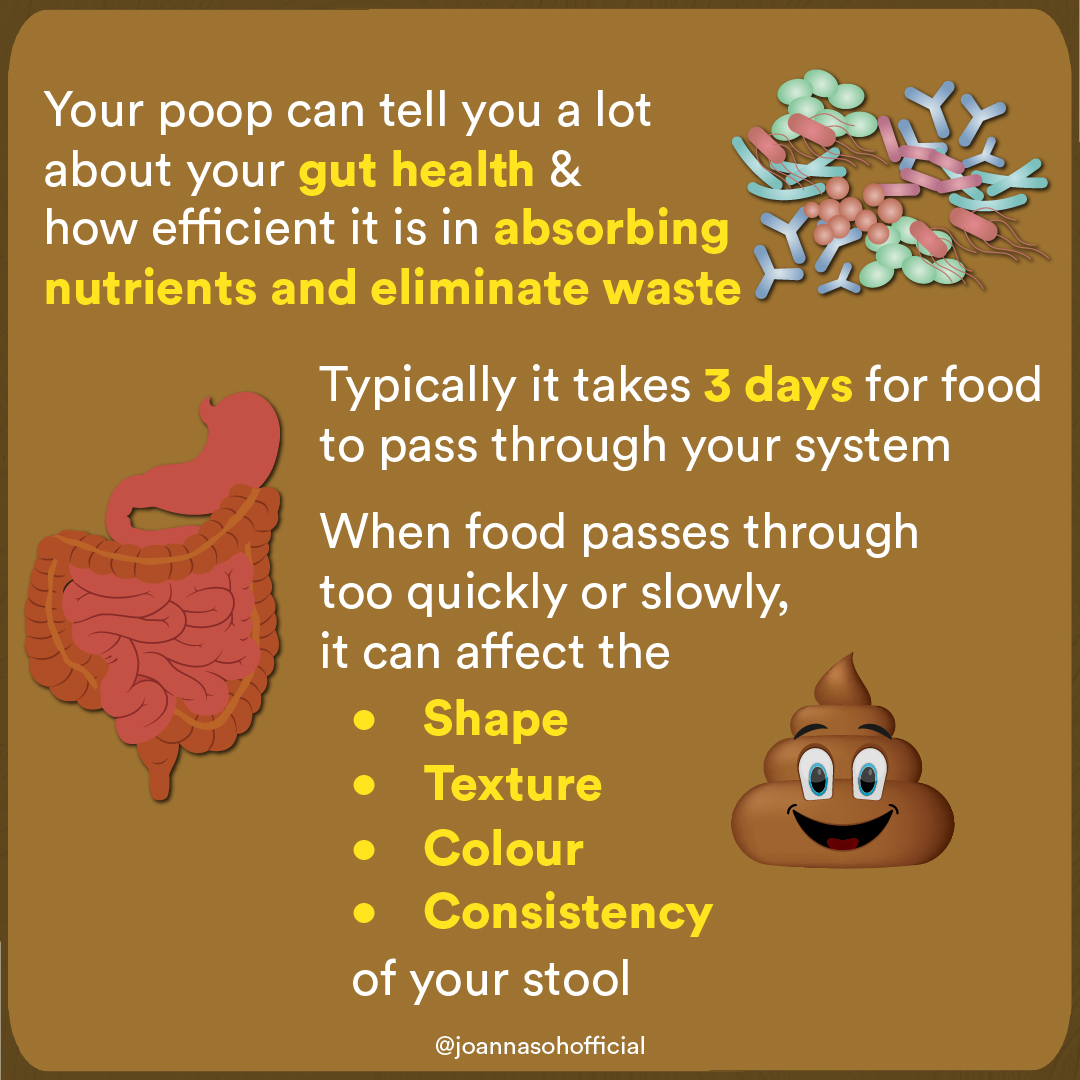
Our faeces is mainly made out of 75% water and 25% solid matter, consisting of dead and living bacteria, indigestible food and inorganic substances. Typically, it takes about one to three days for food to pass through your system. But when food passes through your system too quickly or too slowly, it can affect the shape, texture, colour and consistency of your stool. What and how you eat affects your digestive system. Hence, if you change your diet, you will also notice that your poop could look and smell different. So let’s have a look at the different shapes and texture of poop and what they mean.
Stools Shapes, Size & Colours
1) Constipation
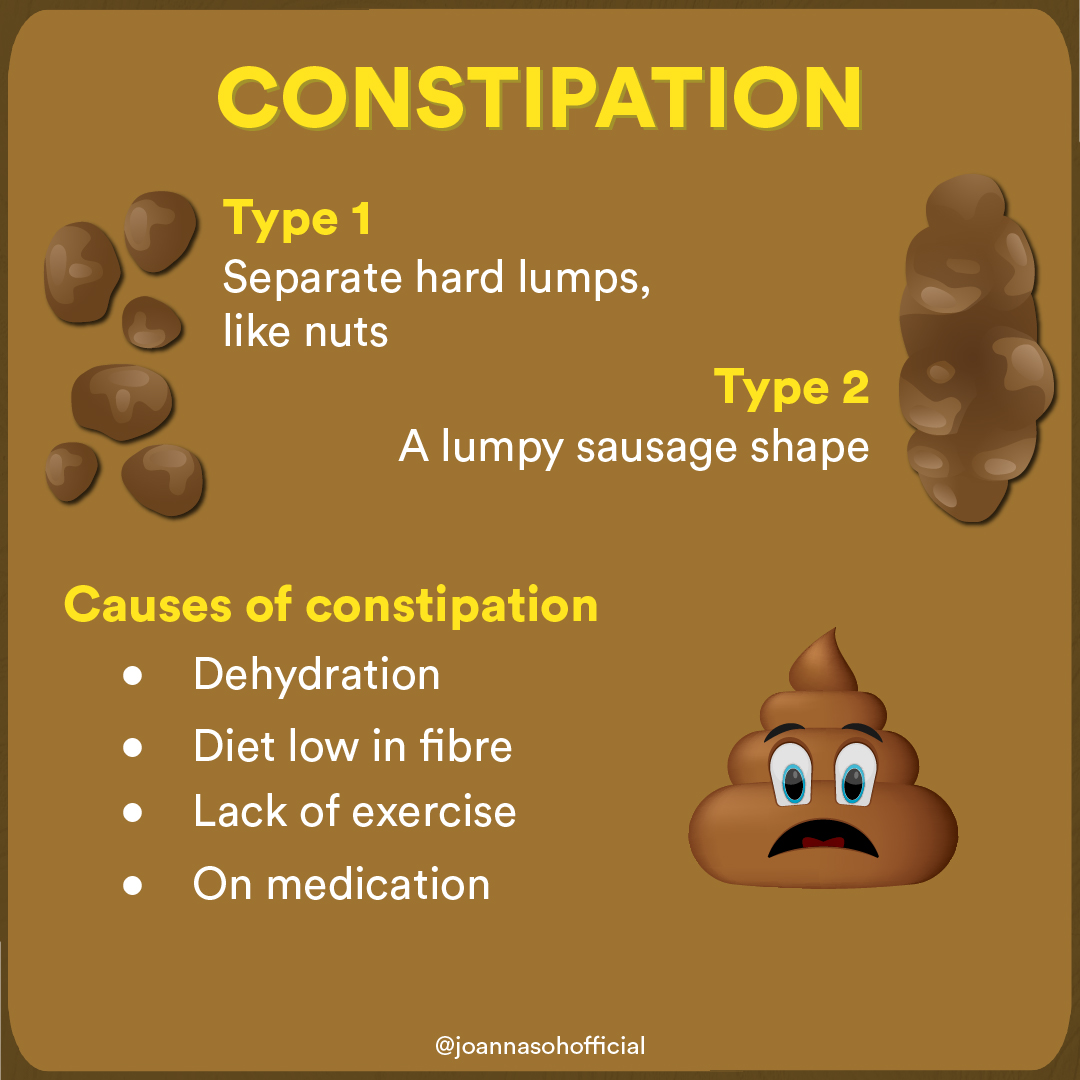
If your stool looks like this - hard and dry and you find it painful and difficult to pass, then you are suffering from constipation. On top of that, you might only have 3 or less bowel movements per week. This may be due to dehydration, a diet low in fibre, lack of exercise or perhaps you’re taking a medication that could also affect your digestive health.
2) Healthy Stool
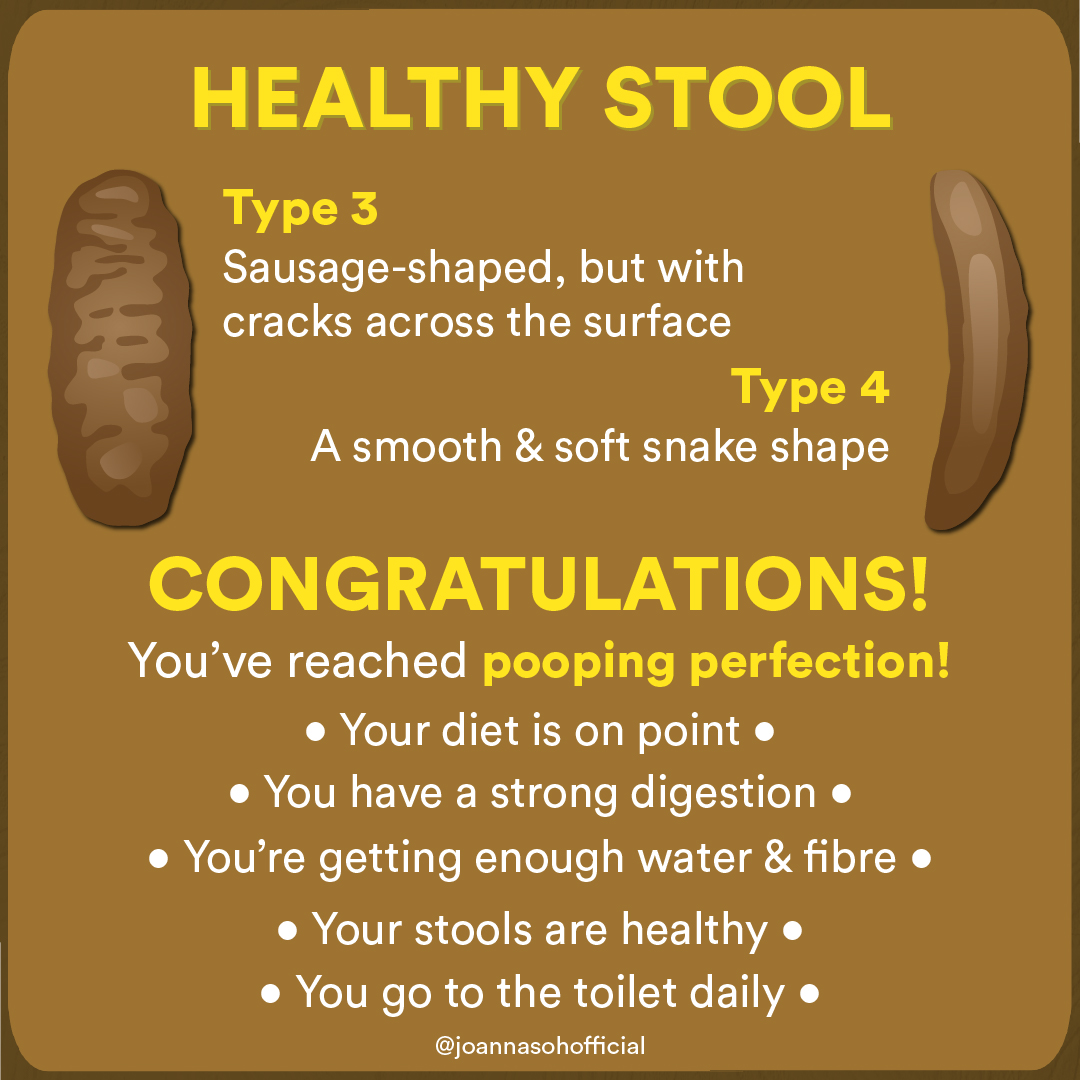
Does your poop look like this on a daily basis? Well congratulations! This is where you want to be. You’ve reached pooping perfection! Your diet is on point and you have a strong digestion! You’re getting enough water and fiber, and your stools are healthy. Everyone’s bathroom habits are different, but the average is once everyday. So keep it up!
3) Weak Gut / Diarrhoea
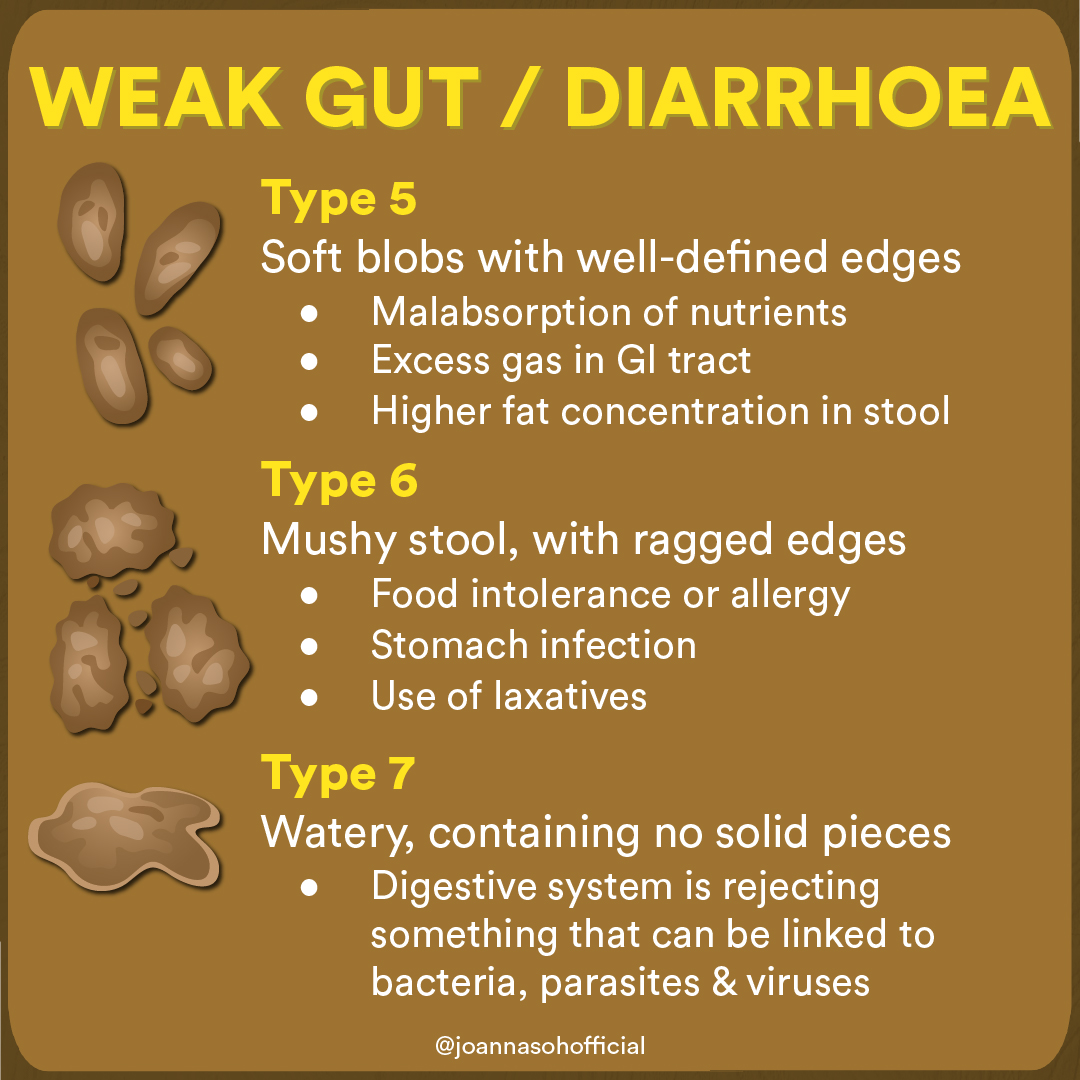
If your poop looks like one of these, it is a sign of a weak gut or diarrhoea. If your poops are soft blobs (type 5), this may be a sign of malabsorption of nutrients, excess gas in the GI tract, or a higher fat concentration in your stool. If it’s fully pieces (type 6), this could be a sign of food intolerance or allergy. Or perhaps you might be experiencing a stomach infection or you’re under the use of a laxative. If your poop is loose and watery (type 7) and you have to go more than three times in one day, that’s diarrhoea. This is an indicator that your digestive system is rejecting something and can be linked to bacteria, parasites, or viruses. If you experience diarrhoea for an extended period of time, you need to seek professional help immediately because it could be linked to another health issue.
3 Tips to Maintain a Healthy Bowel
By just making small dietary changes, this could help you build a stronger gut, increase nutrient absorption from the food you consume and improve the good gut bacteria, and as a result, this can have a positive impact on your mood, energy level and attitude. Here are 3 tips to maintain a healthy bowel.
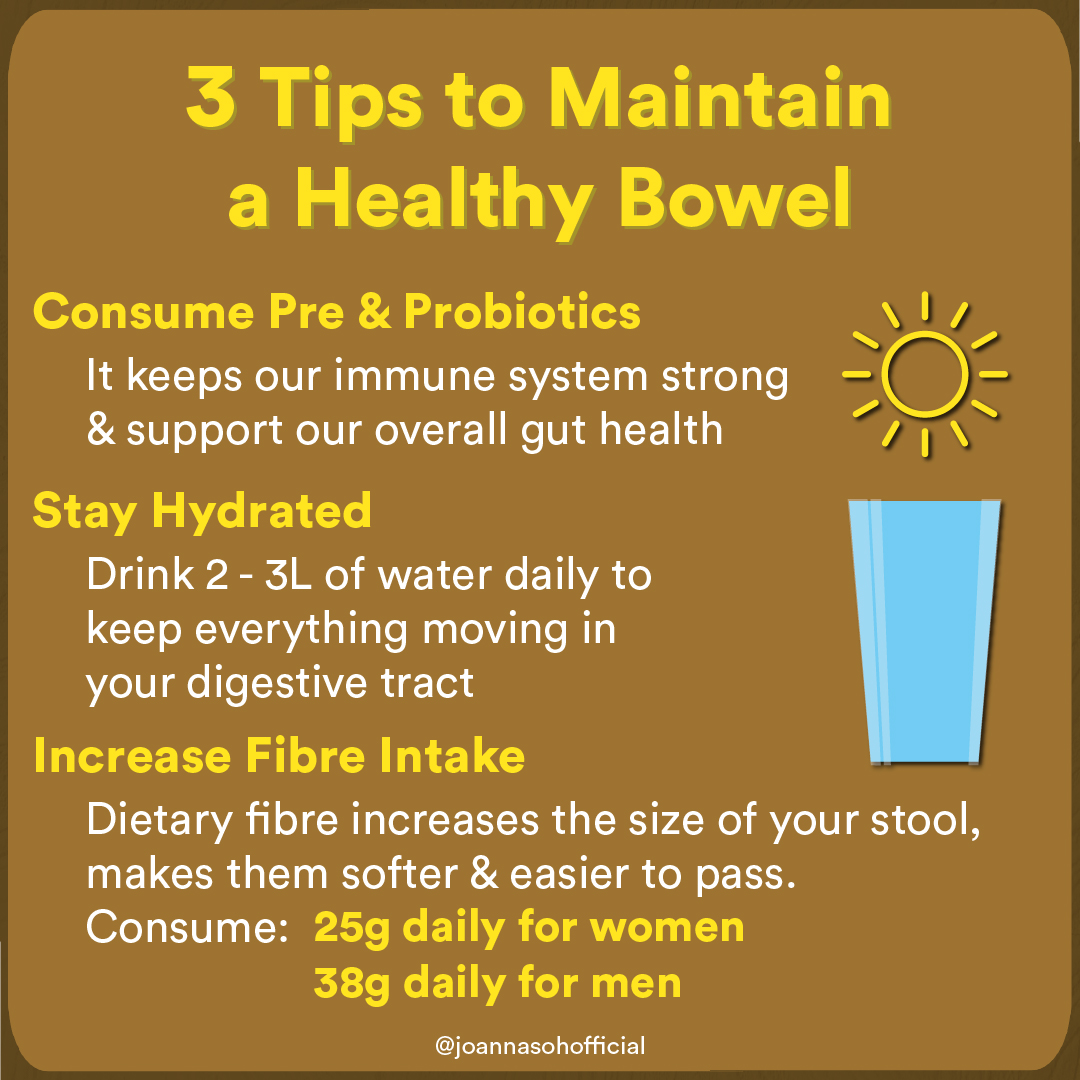
1) Consume Pre & Probiotics Supplements Daily
Digestive issues is often cause by an imbalance in the bacteria that live naturally in your intestines. Our body needs both pre and probiotics to keep our immune system strong and to support our overall gut health. They are both important and play different roles.
Probiotics are food or supplements that contain live microorganisms meant to maintain or improve the “good bacteria” in our body. On the other hand, prebiotics are a type of fibre that the human body cannot digest and they serve as food for probiotics. Ever since I started paying attention to my gut health and consume my pre & probiotics daily, I’ve seen improvement on my mood, energy level and also skin health. Your overall well being starts from your gut.
2) Stay Hydrated
Our body is made up of 60% fluid and our poop is made up of 75% fluid. So how important is water? Drinking enough water is extremely important to keep everything moving in your digestive tract. Yup, we know that we should be drinking at least 2 - 3L of water every day. It sounds like a lot, but a simple ticks is to a drink a glass once you are awake in the morning and drink a glass of water before every meal.
Besides just drinking water, there are also other methods to increase your water intake and stay hydrated. One of it is to eat more foods high in water content. It’s estimated that about 22% of the water we ingest comes from our food. Vegetables which have a high water content (more than 90% water) include spinach, lettuce, bok choy, asparagus, cabbage, celery, cauliflower, cucumber and zucchini. Fruits which are high in water content include citrus, grapefruit, tomato, peach, strawberry, blueberry, watermelon, honeydew and bell pepper.
You want to also reduce drinks that can cause dehydration such as soda, energy drink, coffee, tea and alcohol. These drinks contain diuretic and causes your body and causes you to urinate more frequently. So instead of keep your hydrated, drinking too much can instead dehydrate your body. So consume them in moderation.
3) Increase Your Fibre Intake
Fibre is vital for healthy, solid bowel movements. This is because dietary fibre increases the size of your stools, makes them softer and easier to pass. The general recommendation for dietary fibre intake is 25g for women and 38g for men daily. Set yourself a goal to always fill half of your plate with vegetables every day to increase your fibre intake.
If however you’re telling me that I do consume more than enough fibre, yet I’m always bloated and constipated. Here’s what you need to know. Having too much fibre in your diet can also cause bloating, gas and constipation. This is especially common for someone following a vegan or a raw diet. Eating more than 70g of fibre a day can cause bloating and constipation. So don’t overdo it!
In Essence
How you go, how frequently you go, and the appearance of your stool can tell you a lot about your digestive health and overall health as well. Next time you’re in the bathroom, don’t be so quick to flush, take a look in the toilet bowl and then check your poop. Paying attention to your poop can help you build a stronger gut, check your organ function and boost nutrient absorption from the foods you eat.
_



